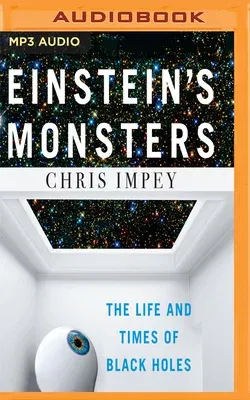The astonishing science of black holes and their role in understanding
the history and future of our universe.
Black holes are the most extreme objects in the universe, and yet they
are ubiquitous. Every massive star leaves behind a black hole when it
dies, and every galaxy harbors a supermassive black hole at its center.
Frighteningly enigmatic, these dark giants continue to astound even the
scientists who spend their careers studying them. Which came first, the
galaxy or its central black hole? What happens if you travel into one -
instant death or something weirder? And, perhaps most important, how can
we ever know anything for sure about black holes when they destroy
information by their very nature?
In Einstein's Monsters, distinguished astronomer Chris Impey takes
listeners on an exploration of these and other questions at the cutting
edge of astrophysics, as well as the history of black holes' role in
theoretical physics - from confirming Einstein's equations for general
relativity to testing string theory. He blends this history with a
poignant account of the phenomena scientists have witnessed while
observing black holes: stars swarming like bees around the center of our
galaxy; black holes performing gravitational waltzes with visible stars;
the cymbal clash of two black holes colliding, releasing ripples in
space-time.
Clear, compelling, and profound, Einstein's Monsters reveals how our
comprehension of black holes is intrinsically linked to how we make
sense of the universe and our place within it. From the small questions
to the big ones - from the tiniest particles to the nature of space-time
itself - black holes might be the key to a deeper understanding of the
cosmos.

